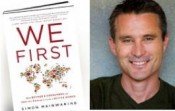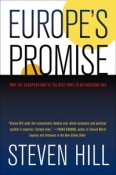NAOMI ORESKES & ERIK CONWAY – THE BIG MYTH: How American Business Taught Us to Loathe Government and Love the Free Market
Written on May 16th, 2023
BRANKO MILANOVIC-Capitalism Rules the World-How do we shrink inequality?
Written on March 21st, 2020In Capitalism, Alone: The Future of the System That Rules the World, BRANKO MILANOVIC says we’re all capitalists now. Liberal capitalism delivers rampant inequality and capitalist excess as it fights for hearts and minds with political capitalism, as practiced by China. Milanovic asks – What are the prospects for a fairer world now that capitalism is the only game in town? And what can we do to make that more likely?
https://stonecenter.gc.cuny.edu/people/milanovic-branko/
NEW Free Forum RAJ PATEL – A History of the World in 7 Cheap Things: A Guide to Capitalism, Nature, and the Future
Written on January 19th, 2018RAJ PATEL has a written a new book (with Jason Moore): A History of the World in Seven Cheap Things: A Guide to Capitalism, Nature, and the Future of the Planet. “Cheap” is the opposite of a bargain and the seven things are nature, money, work, care, food, energy, and lives. Linking the birth of capitalism to the separation of nature and society, telling stories from Christopher Columbus to ChickenMcNuggets, can an examination of the past help us re-imagine the future?
Q&A: SIMON MAINWARING – Author, WE FIRST
Written on November 30th, 2011 |
Aired 11/27/11
At a time when social media is being utilized to coordinate protests against the domination of our economy, our government, and our society by corporations and the very wealthy individuals who profit most from them, SIMON MAINWARING sees a hopeful path to save society from capitalism’s worst excesses. http://wefirstseminar.com/
A social media expert with global experience with brands such as Nike, Toyota and Motorola- he offers a new brand model in which they leverage social media to earn consumer goodwill, loyalty and profit, while promoting sustainable social change through contributions from customer purchases.
The goal of We First is a sustainable practice of capitalism. It is based on the belief that selfish Me First thinking hurts our businesses and the lives of millions of people around the world. It asserts that a brighter future depends on an integration of profit and purpose within the private sector. To achieve this, companies and customers must become partners in social change to build a better world.
Could such innovative partnerships (with shared goals) practice capitalism in a way that satisfies the need for both profit and a healthy, sustainable planet? How realistic is his vision at a time when greed keeps consolidating gains? How much difference could it make even if successful? What has MAINWARING seen in working with these brands that makes him talk about his vision as a likely alternative?
Q&A: STEVEN HILL, Author – Europe’s Promise
Written on June 2nd, 2010 |
Aired 05/30/10
We're hearing a lot about the trouble Europe is in. The debt crisis in Greece, and perhaps Spain, Portugal, and Italy, is threatening the Euro and the European Union. What's really going on? How did it happen? How bad is it? How will they deal with it? And what does it mean for the rest of the world and for the US in particular?
We'll deal with those issues this Sunday, but that's not all. While the bad news of this Euro crisis makes headlines in the US, a quiet and successful revolution taking place in Europe does not. Europe seems to be finding a way to make capitalism and democracy work for people, not just for corporations. I think this is a critical unreported story in terms of its potential impact. Here's just a few things you may not have heard about.
The European Union, 27 member nations with a half billion people, has become the largest, wealthiest trading bloc in the world, producing nearly a third of the world's economy - nearly as large as the U.S. and China combined. Europe has more Fortune 500 companies than either the US, China or Japan.
European nations are rated by the World Health Organization as having the best health care systems in the world. Yet they spend far less than the United States for universal coverage, even as U.S. health care is ranked 37th.
Europe leads in confronting global climate change with renewable energy technologies like solar and wind power, conservation and "green design," creating hundreds of thousands of new jobs in the process. Consequently, Europe's ecological "footprint" (the amount of the earth's capacity that a population consumes) is about half that of the United States for the same standard of living.
